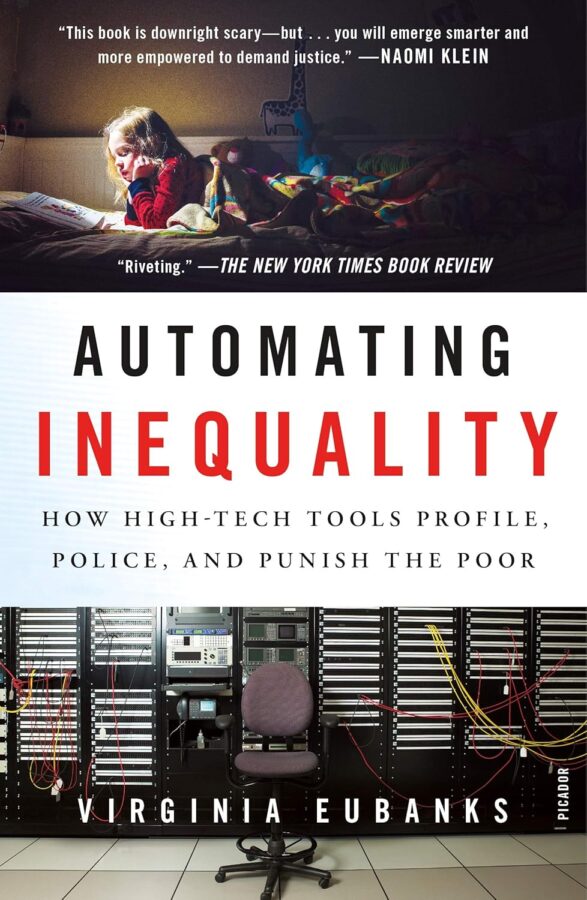A Groundbreaking Examination of Technology and Social Welfare
“Automating Inequality: How High-Tech Tools Profile, Police, and Punish the Poor” by Virginia Eubanks is a powerful and urgent exploration of how digital technologies are transforming the landscape of social services in America. Eubanks, a respected scholar and journalist, brings together years of research and on-the-ground reporting to reveal how data-driven systems, algorithms, and automated decision-making are neutral tools and active participants in perpetuating inequality. This book is essential for anyone interested in the intersection of technology, public policy, and social justice, offering a critical look at how the rise of digital governance impacts the most vulnerable members of society.
How Algorithms Shape Access to Social Services
Eubanks meticulously documents how automated eligibility systems and risk assessment tools are increasingly used to determine who receives public assistance, housing, and other essential services. Through vivid case studies from Indiana, Los Angeles, and Pittsburgh, she illustrates how these systems often create new barriers for the people they are meant to help. The book reveals that rather than streamlining access, automation frequently leads to wrongful denials, bureaucratic nightmares, and a climate of suspicion and surveillance. Eubanks shows that the promise of efficiency and cost savings often comes at the expense of fairness and human dignity.
The Human Cost of Digital Welfare
One of the most compelling aspects of “Automating Inequality” is its focus on the lived experiences of those affected by automated systems. Eubanks shares the stories of families who have been evicted, denied food assistance, or subjected to invasive investigations because of errors or biases in high-tech tools. These personal narratives bring to life the emotional and material consequences of treating social welfare as a data problem rather than a human one. The book powerfully argues that when we allow algorithms to decide who deserves help, we risk dehumanizing entire populations and deepening existing social divides.
The Myth of Technological Neutrality
Eubanks challenges the widespread belief that algorithms and data-driven systems are inherently objective or fair. She explains that these technologies are built on assumptions and values that often reflect and reinforce the prejudices of the societies in which they are created. The book uncovers how historical patterns of discrimination can be encoded into automated systems, resulting in outcomes that disproportionately harm poor and marginalized communities. By exposing the myth of technological neutrality, Eubanks calls for a more critical and informed approach to adopting high-tech tools in public policy.
A Call for Accountability and Human-Centered Design
Throughout “Automating Inequality,” Eubanks advocates for greater transparency, accountability, and public participation in the design and deployment of automated systems. She argues that affected communities should have a voice in how these technologies are used and that policymakers must prioritize the needs and rights of the people they serve. The book offers practical recommendations for building more equitable and compassionate social systems, including robust oversight, meaningful consent, and integrating human judgment into decision-making processes.
Accessible, Engaging, and Essential for the Digital Age
Eubanks writes with clarity, empathy, and a sense of urgency, making “Automating Inequality” accessible to a broad audience. The book is meticulously researched, drawing on interviews, fieldwork, and policy analysis to build a compelling case. It is an invaluable resource for students, advocates, technologists, and anyone concerned about the future of social justice in a digital world. Eubanks’s storytelling brings abstract policy debates to life, making the stakes of algorithmic governance real and immediate.
Why This Book Matters for Policy, Tech, and Social Justice
As governments and organizations increasingly turn to digital tools to manage social services, the questions raised by “Automating Inequality” are more relevant than ever. Eubanks challenges readers to consider who benefits and who is harmed by the automation of public welfare and to demand just, transparent, and accountable systems. Her work is a call to action for policymakers, technologists, and citizens alike to rethink technology’s role in society and ensure that innovation serves the common good.
Where to Learn More and Join the Conversation
For those interested in exploring these critical issues further, “Automating Inequality” is available at major booksellers and libraries. To deepen your understanding, read the NPR review or visit Virginia Eubanks’s website for more resources and updates. Stay tuned for our Amazon affiliate link, where you can purchase your copy and join the movement for more equitable technology and social policy.
Conclusion: A Must-Read for the Age of Digital Governance
“Automating Inequality: How High-Tech Tools Profile, Police, and Punish the Poor” is a vital and timely book that exposes the hidden costs of automating public services. By centring the voices of those most affected and offering a roadmap for more humane and just systems, Virginia Eubanks has created an indispensable resource for anyone invested in the future of technology, democracy, and social welfare.


